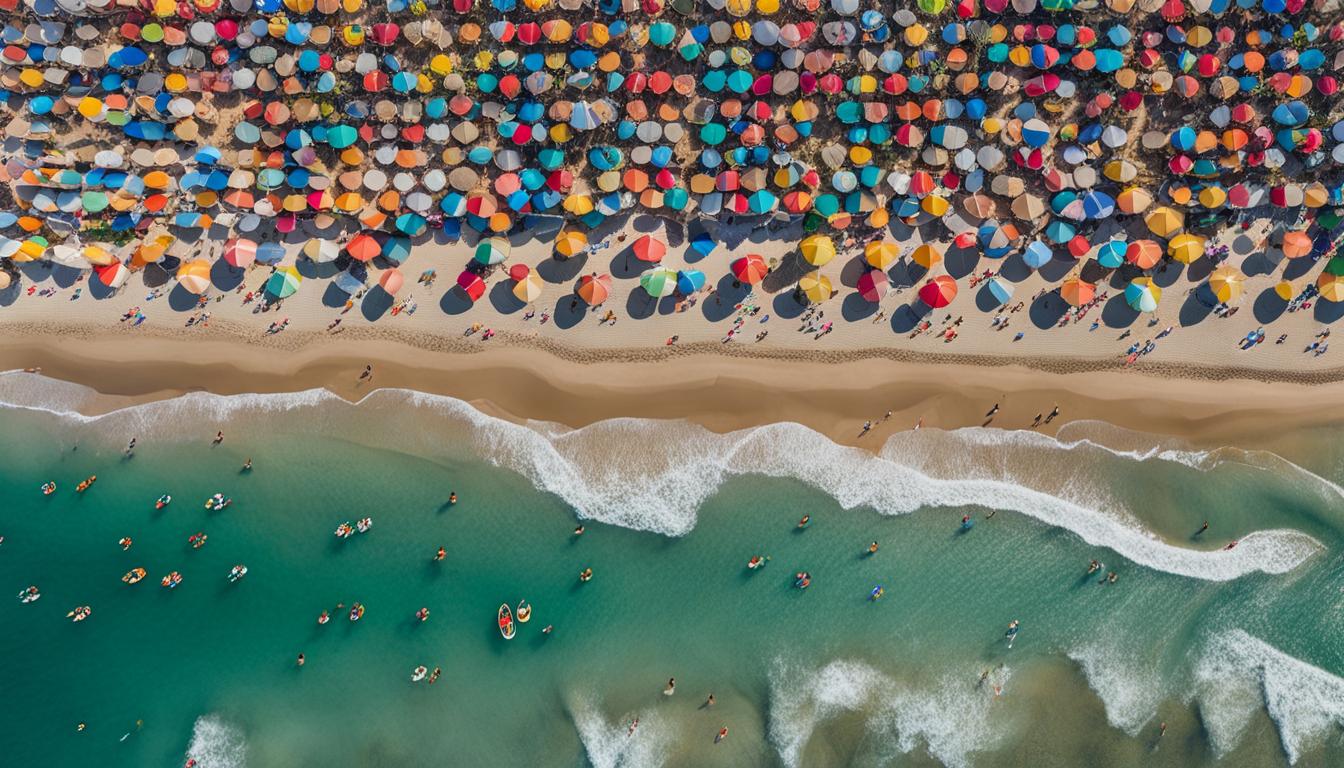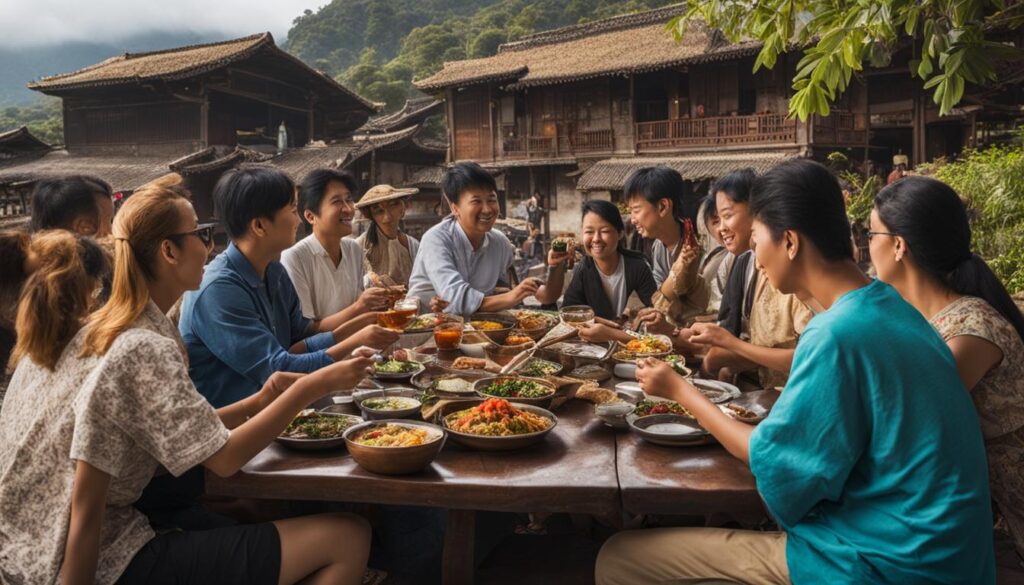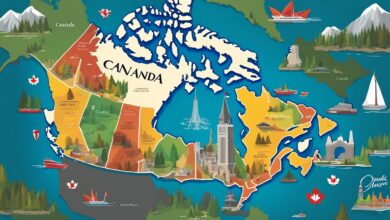5 Social Media Habits to Help Reduce Overtourism

As the tourism industry continues to grow, the negative impact of overtourism on popular destinations is becoming more evident. Overtourism occurs when too many tourists visit a destination, causing overcrowding, environmental damage, and cultural degradation. To address this issue, travelers must adopt sustainable tourism practices that prioritize responsible travel and reduce overtourism’s negative impact.
Social media platforms offer a powerful tool for promoting sustainable tourism practices and reducing overtourism. In this section, we will explore five social media habits that can help travelers make their trips more sustainable and responsible, contributing to the long-term preservation of popular destinations. By adopting these habits, travelers can minimize the negative impact of tourism on local communities and the environment while making their trips more rewarding and fulfilling.
Key Takeaways :
- Reducing overtourism is crucial for sustainable tourism and responsible travel.
- Social media can be a powerful tool for promoting sustainable tourism practices.
- By adopting sustainable tourism practices, travelers can contribute to the long-term preservation of popular destinations.
- The five social media habits discussed in this section can help travelers make their trips more sustainable and responsible.
- By minimizing the negative impact of tourism on local communities and the environment, travelers can make their trips more rewarding and fulfilling.
Understanding Overtourism and its Impact
Overtourism is a phenomenon that occurs when there are too many visitors to a particular destination, resulting in negative impacts on the environment, economy, and local communities. With the advent of budget air travel and growing affluence, tourist overcrowding has become an increasingly pressing issue, particularly in popular destinations.
The consequence of overtourism includes a strain on the local infrastructure and resources, cultural degradation, and damage to the natural environment. The tourism industry has the responsibility of balancing tourism needs with local communities’ interests and taking steps to manage the negative impacts on destinations.
Tourism management plays a crucial role in addressing the issues caused by overtourism. Effective management strategies can help reduce the number of tourists, spread tourism across different seasons and areas, and promote sustainable tourism practices.
| Tourism Management Strategies | Examples |
|---|---|
| Visitor Management | Limiting the number of visitors to a destination, controlling peak-season traffic, and managing tourist flow to reduce overcrowding. |
| Infrastructure Development | Investing in sustainable infrastructure such as public transport, waste management systems, and water conservation measures to reduce the environmental impact of tourism. |
| Community Involvement | Engaging with local communities to ensure their interests are considered in tourism planning and development. |
| Destination Diversification | Promoting lesser-known destinations, encouraging off-season travel, and creating new tourism products and experiences to spread tourism across different regions and seasons. |
By balancing tourism needs with local communities’ interests and implementing effective tourism management strategies, we can reduce overtourism’s negative impacts and promote sustainable, responsible travel.
The Power of Social Media in Tourism
Social media platforms have become powerful tools in shaping travelers’ behaviors and influencing their choice of destinations. The potential of social media to promote sustainable tourism practices, encourage local community engagement, and facilitate effective tourism impact assessments cannot be underestimated. By harnessing the power of social media, travelers can contribute to the development of sustainable infrastructure and responsible tourism practices.
One of the key advantages of social media is its ability to connect travelers with local communities. Through social media channels, travelers can learn about local cultures, traditions, and customs, gaining a deeper understanding of the places they visit. This understanding, in turn, can lead to more responsible and respectful travel practices, which can help reduce the negative impact of tourism on local communities.
Social media can also be a powerful tool in facilitating tourism impact assessments. By sharing feedback and reviews on social media, travelers can help destination managers to identify areas of improvement and prioritize sustainable tourism initiatives. This feedback can also help travelers make more informed decisions about where to stay, what to see, and how to interact with local communities, contributing to a more responsible and sustainable approach to travel.
Sustainable Infrastructure
Another way social media can contribute to sustainable tourism practices is by promoting the development of sustainable infrastructure. By sharing information and updates on sustainable tourism initiatives, travelers can help raise awareness and encourage stakeholders to invest in essential infrastructure such as public transportation, waste management facilities, and renewable energy sources. This can help reduce the negative environmental impact of tourism while providing local communities with the necessary resources for long-term sustainability.
Local Community Engagement
Social media can also encourage local community engagement, which is crucial for the long-term sustainability of tourism destinations. By sharing information about local events and festivals, travelers can help promote local culture and support local businesses. Furthermore, travelers can use social media channels to share information on responsible travel practices, thereby encouraging local communities to adopt more sustainable approaches to tourism.
| Pros | Cons | |
|---|---|---|
| Pros | Effective in promoting sustainable tourism practices | Not all travelers use social media |
| Cons | Can be misused to promote unsustainable tourism practices | Not all local communities benefit from tourism |
In conclusion, social media platforms have become essential tools in promoting sustainable tourism practices, encouraging local community engagement, and facilitating effective tourism impact assessments. By adopting responsible social media habits, travelers can play an essential role in reducing overtourism, promoting sustainable infrastructure, and supporting local communities for a long-term and fulfilling travel experience.
Habit 1 – Sharing Authentic Local Experiences
One of the most effective ways to promote responsible travel and reduce overtourism is by sharing authentic local experiences on social media. By doing so, travelers can promote local community engagement and support the economic growth of the destination.
Sharing unique experiences that are off the beaten path, rather than the typical tourist hotspots, not only helps to alleviate overcrowding but also offers a more authentic and immersive travel experience. Travelers can use hashtags, geotags, and location-specific tags to promote local businesses and communities. Collaborating with locals, interacting with small vendors, and promoting sustainable tourism initiatives can all help to make a positive impact on the destination.
Example: A traveler visiting Bali, Indonesia, could share their experience of participating in a traditional Balinese cooking class led by a local Balinese chef. By sharing the unique experience on social media and tagging the cooking school, other travelers can discover the local business and support the preservation of Balinese culture.
Habit 2 – Promoting Off-Season Travel
Traveling during peak tourist season can contribute to overtourism and put a strain on popular destinations’ resources. To promote sustainable tourism and reduce overtourism, travelers should consider visiting destinations during the off-season. By doing so, travelers can experience the destination in a more relaxed and authentic way, avoid crowds, and help distribute tourism revenue more evenly throughout the year.
Some of the benefits of off-season travel include lower prices, fewer tourists, shorter lines, less congested roads, and more comfortable accommodations. Moreover, travelers can have a more meaningful cultural exchange with locals, enjoy seasonal activities, and observe the natural beauty of the destination without the crowds.
When promoting off-season travel, social media can be a powerful tool to showcase the destination’s unique features and dispel misconceptions about traveling during the low season. Travelers can use their own photos and videos to demonstrate the beauty of the destination and share their experiences with the local community. Moreover, travelers can create content that highlights the advantages of traveling off-season, such as lower costs, fewer tourists, and more authentic experiences.
“Off-season travel allows me to enjoy some of the most beautiful and unique destinations without the crowds. It also gives me the chance to connect with locals and learn more about their culture. By promoting off-season travel on social media, I hope to inspire other travelers to explore the world in a more sustainable and responsible way.”
Finally, by promoting off-season travel, travelers can contribute to the development of sustainable tourism practices. By supporting the local community during the low season, travelers can help to create a more sustainable tourism economy that benefits both tourists and locals. Moreover, off-season travel can help to reduce the negative impact of tourism on popular destinations, preserving their natural and cultural heritage for future generations to enjoy.
Habit 3 – Supporting Locally Owned Businesses
A critical aspect of responsible travel is supporting locally owned businesses. Not only does this contribute to sustainable tourism, but it also helps boost the economic growth of local communities. By promoting and recommending local businesses through social media platforms, travelers can make a positive impact on the destinations they visit.
When selecting accommodations, consider staying at locally owned hotels or guesthouses instead of global chains. Not only can these businesses provide a more authentic and unique experience, but they also provide direct support to the local economy.
Additionally, patronizing locally owned restaurants and shops can also have a significant impact. For example, purchasing souvenirs from local artisans instead of mass-produced trinkets helps support local craftsmanship and cultural preservation. Not to mention, the quality of the products is often far superior to those found in touristy areas.
By sharing your positive experiences at these local establishments on social media, you can encourage others to do the same and contribute to sustainable tourism efforts.
Habit 4 – Raising Awareness about Overtourism
Raising awareness about overtourism is crucial in creating a global movement towards sustainable tourism practices. By using social media platforms to educate and inspire others to travel responsibly, we can contribute to the reduction of overtourism and promote sustainable tourism. To raise awareness, consider:
- Sharing data and statistics about overtourism and its impact on destinations
- Creating compelling content that encourages responsible travel practices
- Engaging with followers and other travel communities to promote the message of sustainable tourism
- Collaborating with local tourism boards and organizations that advocate for sustainable tourism practices
Through these efforts, we can help travelers understand the importance of responsible travel and encourage them to make conscious choices when visiting popular destinations.
“The traveler sees what he sees. The tourist sees what he has come to see.” – G.K. Chesterton
By raising awareness about overtourism and promoting responsible travel practices, we can help shift the focus from being a tourist to experiencing a destination through the eyes of a traveler.

Habit 5 – Engaging with Responsible Travel Communities
Engaging with responsible travel communities and influencers on social media can amplify the message of sustainable tourism and foster a sense of collective responsibility. This habit involves actively participating in and contributing to these communities to make a more significant impact in reducing overtourism.
There are various ways to engage with responsible travel communities on social media, such as joining relevant groups, following accounts that promote sustainable tourism, and participating in discussions and campaigns. By connecting with like-minded individuals and sharing experiences and insights, travelers can learn from others’ perspectives and gain inspiration for responsible travel practices.
Tip: Look for hashtags related to responsible travel and sustainable tourism, such as #responsibletourism, #sustainabletravel, or #ecotourism, to discover relevant accounts and communities.
| Benefits of Engaging with Responsible Travel Communities | How to Engage with Responsible Travel Communities |
|---|---|
|
|
By engaging with responsible travel communities, travelers can not only contribute to reducing overtourism but also inspire others to do the same. Together, we can create a more sustainable and responsible travel culture that prioritizes the well-being of local communities, the environment, and future generations.
Habit 5 – Implementing Sustainable Tourism Practices
Beyond social media habits, implementing sustainable tourism practices is essential in reducing overtourism. Sustainable tourism is all about promoting responsible travel to minimize the negative impact on the environment, economy, and local communities. Destination management is a crucial aspect of sustainable tourism, focusing on responsible planning, development, and management of a destination, taking into account various stakeholders’ needs.
Practical Tips for Sustainable Tourism
Implementing sustainable tourism practices requires a conscious effort from travelers to minimize their impact on the destination they visit. Here are some practical tips to promote sustainable tourism:
- Choose eco-friendly accommodations that adhere to sustainable practices and support the local economy.
- Reduce carbon footprint by using public transport or walking rather than renting a car.
- Support local businesses, especially those that focus on sustainability and responsible travel.
- Conserve natural resources by minimizing waste, saving water, and reducing energy consumption.
- Respect the local culture, traditions, and values, and show appreciation for the destination’s heritage.
- Participate in local conservation efforts, such as beach cleanups or wildlife protection programs.
By adopting sustainable tourism practices, travelers can contribute to the local economy’s growth, preserve the destination’s natural and cultural resources, and promote responsible travel for future generations.
“Sustainable tourism is not just a form of tourism; it is a way of life. It is about being conscious of our actions and making decisions that positively impact the environment and local communities. By practicing sustainable tourism, we can ensure that future generations can enjoy the same beautiful destinations we do.” – Jane Doe, Sustainable Travel Advocate
Conclusion
To reduce overtourism and promote sustainable, responsible travel, adopting five social media habits is just the start. Travelers must also engage in destination management efforts and support sustainable tourism initiatives to make a long-term impact.
Implementing Sustainable Tourism Practices
Travelers can engage in several sustainable tourism practices, including minimizing their environmental footprint, respecting local culture and traditions, and supporting local economies. They can also participate in tourism impact assessments and engage with local communities to promote responsible travel practices.
The Role of Tourism Management
Effective tourism management is crucial in balancing the interests of visitors and local communities. Destination managers must develop sustainable infrastructure, regulate tourism flows, and educate visitors on responsible travel practices to minimize overtourism and its negative impacts.
In conclusion, promoting sustainable tourism practices and responsible travel habits are essential in reducing overtourism and preserving popular destinations for future generations. By adopting these practices and habits, travelers can enjoy more rewarding and fulfilling trips while contributing to the development of sustainable tourism and destination management.
FAQ
What is overtourism?
Overtourism refers to the excessive number of tourists visiting a destination, leading to overcrowding, strain on resources, and negative impacts on the local community and environment.
How can social media habits help reduce overtourism?
By adopting specific social media habits, travelers can contribute to reducing overtourism by promoting responsible travel practices, supporting local communities, raising awareness, and engaging with sustainable tourism initiatives.
What are the five social media habits to help reduce overtourism?
The five social media habits are: sharing authentic local experiences, promoting off-season travel, supporting locally owned businesses, raising awareness about overtourism, and engaging with responsible travel communities.
How can sharing authentic local experiences help reduce overtourism?
Sharing authentic local experiences promotes responsible travel practices and encourages engagement and support of local communities. It helps to diversify tourism activities and distribute tourist traffic more evenly.
Why is promoting off-season travel important for reducing overtourism?
Promoting off-season travel helps to distribute tourist traffic throughout the year, minimizing congestion and strain on popular destinations. It also supports the local economy during periods of lower tourist numbers.
How does supporting locally owned businesses contribute to reducing overtourism?
Supporting locally owned businesses helps to strengthen the local economy and reduce the dependence on mass tourism. By promoting and recommending these businesses on social media, travelers can contribute to sustainable tourism practices.
What is the role of raising awareness about overtourism?
Raising awareness about overtourism is crucial in creating a global movement towards sustainable tourism practices. By using social media platforms to educate and inspire others, travelers can contribute to the reduction of overtourism.
How can engaging with responsible travel communities make an impact?
Engaging with responsible travel communities and influencers on social media amplifies the message of sustainable tourism and fosters a sense of collective responsibility. It allows travelers to learn from shared experiences and make a more significant impact in reducing overtourism.
What are some practical tips for implementing sustainable tourism practices?
Some practical tips include respecting local customs and cultures, minimizing waste and reducing plastic usage, supporting sustainable transportation options, and choosing accommodations that prioritize eco-friendly practices.
How do these social media habits contribute to sustainable tourism?
These social media habits contribute to sustainable tourism by encouraging responsible travel practices, promoting local community engagement, raising awareness about overtourism, and fostering collaboration and collective action among travelers.
Why is responsible travel important for reducing overtourism?
Responsible travel is important because it ensures that tourism activities have a positive impact on destinations, their ecosystems, and local communities. It helps to preserve cultural heritage, protect natural resources, and promote sustainable development.




One Comment